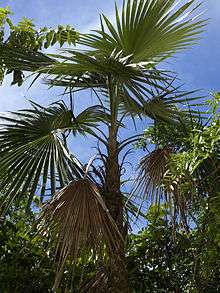Coccothrinax argentea
| Coccothrinax argentea | |
|---|---|
 | |
| Scientific classification | |
| Kingdom: | Plantae |
| (unranked): | Angiosperms |
| (unranked): | Monocots |
| (unranked): | Commelinids |
| Order: | Arecales |
| Family: | Arecaceae |
| Genus: | Coccothrinax |
| Species: | C. argentea |
| Binomial name | |
| Coccothrinax argentea (Lodd. ex Schult. & Schult.f.) Sarg. ex Becc. | |
Coccothrinax argentea is a palm which is endemic to Hispaniola.[1] It is a medium-sized palm (growing about 10 m tall. Leaves are dark green above and silvery below.[2] Like other Coccothrinax species, C. argentea is a fan palm. Very young leaves are eaten as a vegetable. [3] It is also used medicinally by traditional healers to treat uterine fibroids and hot flashes.[4]
This species is frequently confused with Coccothrinax argentata.
Common names include: Hispaniola silver thatch palm,[2] Cana,[4] Guano, Latanye marron, Latanye savanne,[5] Broom palm, Hispaniolan silver palm, Silver thatch palm, Palmera plateada de La Hispaniola, Guanito, Guano de escoba.
References
- ↑ "Coccothrinax argentea". Royal Botanic Gardens, Kew: World Checklist of Selected Plant Families. Retrieved 2007-01-30.
- 1 2 Palm and Cycad Society of Australia. "Palms: Coccothrinax argentea". Retrieved 2007-01-30.
- ↑ Haynes, Jody; John McLaughlin (November 2000). "Edible Palms and Their Uses" (PDF). Fact Sheet MDCE-00-50-1. University of Florida Institute of Food and Agricultural Sciences. Retrieved 2007-01-30.
- 1 2 Balick, Michael J.; Fredi Kronenberg; Andreana L. Ososki; Marian Reiff; Adriane Fugh-Berman; Bonnie O’Connor; Maria Roble; Patricia Lohr; Daniel Atha (2000). "Medicinal plants used by Latino healers for women's health conditions in New York City" (Scholar search). Economic Botany. 54 (3): 344–357. doi:10.1007/BF02864786. Retrieved 2007-01-30.
- ↑ Henderson, Andrew; Galeano, Gloria; Bernal, Rodrigo (1995). Field Guide to the Palms of the Americas. Princeton, New Jersey: Princeton University Press. ISBN 0-691-08537-4.
This article is issued from Wikipedia - version of the 7/7/2015. The text is available under the Creative Commons Attribution/Share Alike but additional terms may apply for the media files.